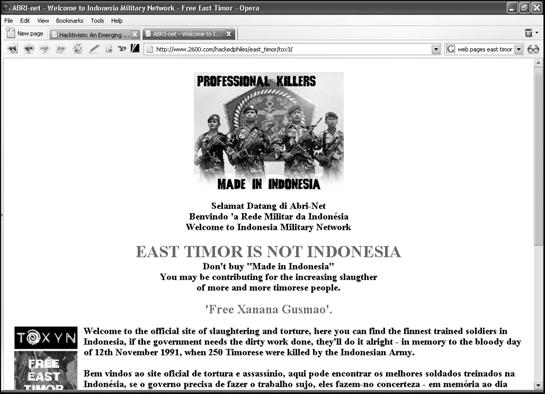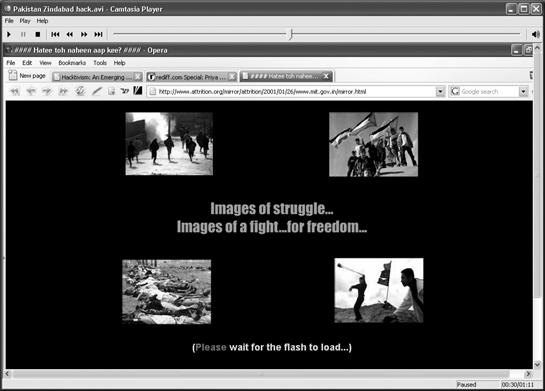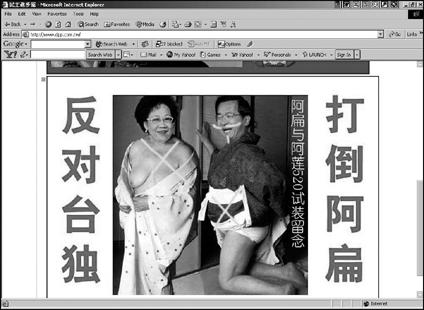Email bombing and virtual sit-ins can disrupt a target, but unless people know why you're doing what you're doing, it could come across as simply an act of electronic vandalism rather than a political protest. To deliver their message another way, hacktivists often deface the home pages of prominent websites such as NASA, the FBI, and even the White House. By defacing high-profile websites, hacktivists can ensure that a large group of people will read their message. Here are a few examples.
One of the earliest politically motivated web page defacements occurred in 1998, when Portuguese hackers broke into several Indonesian government websites to protest Indonesia's treatment of East Timor, a former Portuguese colony, as shown in Figure 16-6.
Figure 16-6. A defaced website, such as this hijacked version of the Indonesian Department of Foreign Affairs, can publicize a cause while embarrassing the hacked website at the same time.
In June 1998, a group of hackers calling themselves Milw0rm hacked into the website of India's Bhabha Atomic Research Center (BARC)—www.barc.ernet.in—and defaced it to show the distinctive mushroom cloud explosion of an atomic bomb along with the text, "If a nuclear war does start, you will be the first to scream. . . . "
In 1999, Pakistani and Indian military forces were engaged in combat along the Kargil region. Pakistani hackers targeted various Indian government websites including www.armyinkashmir.com, which provided factual information about Indian military forces in the Kashmir Valley. Pakistani hackers defaced the site and posted photographs showing Indian military forces allegedly killing Kashmiri militants with captions that read "Massacre," "Torture," and "The agony of crackdown." Pakistani hackers also targeted India's Department of Information Technology (www.mit.gov.in) site and replaced it with Flash movie images as shown in Figure 16-7.
Figure 16-7. Pakistani hackers have posted political messages on various Indian government websites.
Hackers on both sides of the 1998 Kosovo conflict targeted their opponents' websites. An American hacking group called Team Spl0it claims to have defaced web pages of the Yugoslavian government with messages saying, "Tell your governments to stop the war." The Serb Black Hand hackers group claims it retaliated by deleting all the data on a US Navy computer.
Perhaps more frightening is that hackers have targeted many sensitive US government websites and claim to have gotten in. In May 2001, the official White House site (www.whitehouse.gov) even shut down for three days due to a nonstop denial of service attack by unknown hackers. Another hacker group, Hong Kong Danger Duo, later claimed to have broken into the White House site and left the message, "Stop all war. Consintrate on your problems. Nothing was damaged, but we are not telling how we got in."
After NATO accidentally bombed the Chinese embassy in 1999, Chinese hackers entered the fray, targeting official US government websites. The Department of the Interior's website was defaced with pictures of the three Chinese journalists who had been killed in the bombing, while the Department of Energy's website contained a message that read:
Protest U.S.A.'s Nazi action! Protest NATO's brutal action! We are Chinese hackers who take no cares about politics. But we can not stand by seeing our Chinese reporters been killed which you might have know. Whatever the purpose is, NATO led by U.S.A. must take absolute responsibility. You have owed Chinese people a bloody debt which you must pay for. We won't stop attacking until the war stops!
Of course, the Chinese government has come under its own share of hacker attacks by hacktivists protesting the country's lack of democracy and human rights. One hacker group, the Hong Kong Blondes, allegedly infiltrated police and security networks to monitor China's intelligence activities and warn political dissidents of imminent arrests. Two hackers, called Bronc Buster and Zyklon, claimed they disabled five Chinese firewalls, allowing Chinese citizens uncensored Internet access.
After Taiwan's President Lee Teng-hui declared on July 9, 1999, that China had to deal with Taiwan on a "state-to-state" basis, a cyberwar quickly erupted between each country's respective hackers. The Taiwanese hackers planted a red and blue Taiwanese national flag and an anti-Communist slogan: "Reconquer, Reconquer, Reconquer the Mainland," on Chinese Internet company websites. In turn, the Chinese hackers defaced the website of Taiwan's Democratic Progressive Party (www.dpp.org.tw) and displayed digitally altered images of the President and Vice President, as shown in Figure 16-8.
Figure 16-8. Chinese hackers reportedly defaced this web page in retaliation for Taiwan's demands for independence.
Back in the US, on January 18, 2005, a hacker group called "the Internet Liberation Front (ILF)" defaced six Republican Party websites and left the following message:
In solidarity with the billions around the world who are being oppressed under the Bush agenda, The Internet Liberation Front has hacked and defaced six Republican websites who push forward the sick and violent ideology of warfare, capitalism, and profit over people.
Following the publication of a cartoon, in a Danish newspaper, depicting the prophet Mohammed carrying a bomb on his head, Muslims rioted around the world to protest. One hacktivist group, calling themselves the Red Devils Crew, took their protests to the Internet and on February 27, 2006, defaced the website of a company called Plasq.com, which sells a comic book–making program called Comic Life. In place of the original home page, the Red Devils Crew hacktivists posted the following message.
We were deeply shocked seeing a Danish newspaper (Jyllands Posten) offending almost 1.5 billion Muslims around the world by publishing a cartoon of the Prophet Mohammed seen as a terrorist carrying bombs on his head!
I just wonder, would your government reaction have been the same if the cartoon displayed Prophets Jesus or Moses!? I don't think so ...
Defacing web pages to promote a cause only works if people get a chance to see your message before the affected website administrator takes it down. The window of opportunity can be anywhere from a few hours to a few days.
Wherever there's war, conflict, disagreements, and power, you'll find web page defacements following closely behind physical force. Although it may be illegal, and breaking into a computer may be considered trespassing, it's certainly a less destructive alternative to shooting, bombing, and slaughtering. In that regard, hacking could actually be considered more ethical than any traditional show of military force.


